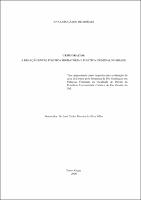| Share record |


|
Please use this identifier to cite or link to this item:
https://tede2.pucrs.br/tede2/handle/tede/6476| Document type: | Tese |
| Title: | Crimigração : a relação entre política migratória e política criminal no Brasil |
| Author: | Moraes, Ana Luisa Zago de  |
| Advisor: | Silva Filho, José Carlos Moreira da |
| Abstract (native): | A política migratória brasileira inicialmente estava relacionada à colonização, e os colonos imigrantes eram considerados úteis para o povoamento e o trabalho agrícola. A política criminal preocupava-se com os escravos libertos e seus descendentes, criminalizando a capoeira e a vadiagem, e a elas atribuindo a pena de expulsão. Na Primeira República, iniciou-se a construção do imigrante como anarquista-estrangeiro e a política deixou de ser de atração. Paralelamente, a expulsão tornou-se medida administrativa e destinada à retirada, de forma célere e definitiva, dos inimigos políticos da república. Durante o Estado Novo, ocorreu o estopim da repressão ao estrangeiro: não mais imigrante, como nos tempos da colonização. Já havia iniciado a valorização do nacional e a proibição da entrada dos indesejáveis, o que gerou perseguições a comunistas, anarquistas, prostitutas e cáftens. Na Ditadura militar, consolidou-se a doutrina da segurança nacional em matéria de migrações, em uma política de “segurança das migrações”, e consolidou-se também a desvinculação do direito penal da repressão ao imigrante. Paralelamente, a política criminal passou adotar postulados da segurança nacional de combate a inimigos, e a partir disso a guerra às drogas ocupou-se de inimigo transnacional, o traficante de drogas. Com base nesse legado, investiga-se como opera a “crimigração” após a última transição democrática e a abertura constitucional aos direitos humanos, para além do universo da prisão, ou seja, para abranger a situação do imigrante como sujeito de direitos, mas também “sujeito de” vulnerabilidades transnacionais e de controle e criminalização pelo Estado. Soma-se a isso uma reflexão sobre uma política migratória democrática e pautada nos direitos humanos e na não criminalização, bem como sobre a justiça de transição como possibilidade para uma efetiva transição democrática em matéria de migrações. |
| Abstract (english): | The Brazilian migration policy initially was related to colonization, and migrants were considered useful for the population and agricultural work. The objective of criminal policy was to control the slaves and their descendants, criminalizing their way of life, fights and sports, like “capoeira”, and using the deportation against them. In the First Republic, immigration started to be related with anarchism. In this context, the immigration policy started to be directed to restriction of entrance, and the deportation became an administrative measure destinated to the political enemies of the republic. During the Vargas Era, the repression of “foreigners” has increased: no more nominated “migrants”, as in the times of colonization. It had already started the appreciation of the national worker and the prohibition of entry of undesirable, which led to persecution of communists, anarchists and prostitutes. During the civil military dictatorship, the doctrine of national security was consolidated and adapted to migration policy, in a "safe migration" policy. In this period, criminal law was not destinated to the repression of immigrants, but criminal policy has adopted postulates of national security to combat enemies, and the war on drugs and against the international drug smugglers. Based on this, we investigate the crimmigration since the last democratic transition and constitutional promotion of human rights. For these objectives, we consider migrants as fundamental rights holders, but also victims of transnational vulnerabilities and control and criminalization by the states. Added to this, we reflect about transitional justice for a democratic immigration policy, guided in human rights and non-criminalization. |
| Keywords: | DIREITO POLÍTICA CRIMINAL DITADURA IMIGRAÇÃO - BRASIL CRIMINOLOGIA |
| CNPQ Knowledge Areas: | CIENCIAS SOCIAIS APLICADAS::DIREITO |
| Language: | por |
| Country: | Brasil |
| Publisher: | Pontifícia Universidade Católica do Rio Grande do Sul |
| Institution Acronym: | PUCRS |
| Department: | Faculdade de Direito |
| Program: | Programa de Pós-Graduação em Ciências Criminais |
| Access type: | Acesso Aberto |
| URI: | http://tede2.pucrs.br/tede2/handle/tede/6476 |
| Issue Date: | 27-Nov-2015 |
| Appears in Collections: | Programa de Pós-Graduação em Ciências Criminais |
Files in This Item:
| File | Description | Size | Format | |
|---|---|---|---|---|
| TES_ANA_LUISA_ZAGO_DE_MORAES_PARCIAL.pdf | Texto Parcial | 533.35 kB | Adobe PDF |  Download/Open Preview |
Items in DSpace are protected by copyright, with all rights reserved, unless otherwise indicated.




